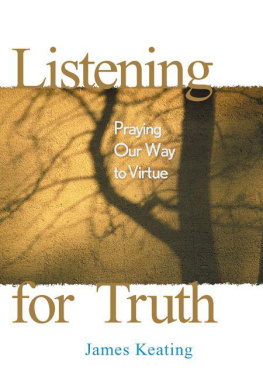
DEDICATION
To Marianne, Pink, and Mack
ENDORSEMENTS

"If couples read this book, they will notice that the way of love is one. Since God is love, if couples know how to communicate genuine love to one another, they will already know how to be intimate with God. Through three simple principles, couples are shown that their sacramental love for one another is precisely what launches them to the highest happiness possible happiness in God."
- Christopher West, author, Fill These Hearts: God, Sex, and the Universal Longing
"Whether you are a lay person or clergy directly involved with Marriage preparation, consider it providential that this book has crossed your path. Give this book the time it deserves so that you might receive, pray, and be changed in your understanding of the vocation of Marriage!"
- Valerie Conzett, D.Min., L.PC., Director, Family Life Office, Archdiocese of Omaha, NE
NIHIL OBSTAT: | Father Matthew J. Gutowski, STL |
IMPRIMATUR: | Most Reverend George J. Lucas
Archbishop of Omaha, Neb.
January 18, 2013 |
THE INSTITUTE FOR PRIESTLY FORMATION
IPF PUBLICATIONS
2500 California Plaza
Omaha, NE
www.priestlyformation.org
Copyright February 1, 2013
The Institute for Priestly Formation, Inc.
All Rights Reserved. No part of this book may be reproduced, stored in a retrieval system, or transmitted by any means, electronic, mechanical, photocopying, recording, or otherwise, without the written permission of The Institute for Priestly Formation.
Printed in the United States of America
ISBN-13: 978-0-9843792-8-6
ISBN-10: 0-9843792-8-2
Scripture texts in this work are taken from the New American Bible, revised edition 2010, 1991, 1986, 1970 Confraternity of Christian Doctrine, Washington, D.C., and are used by permission of the copyright owner. All Rights Reserved. No part of the New American Bible may be reproduced in any form without permission in writing from the copyright owner.
Book design by FAITH Catholic Publishing and Communications, Lansing, Mich.
THE INSTITUTE FOR PRIESTLY FORMATION
Mission Statement

The Institute for Priestly Formation was founded to assist bishops in the spiritual formation of diocesan seminarians and priests in the Roman Catholic Church. The Institute responds to the need to foster spiritual formation as the integrating and governing principle of all aspects for priestly formation. Inspired by the biblical-evangelical spirituality of Ignatius Loyola, this spiritual formation has as its goal the cultivation of a deep interior communion with Christ; from such communion, the priest shares in Christ's own pastoral charity. In carrying out its mission, the Institute directly serves diocesan seminarians and priests, as well as those who are responsible for diocesan priestly formation.
THE INSTITUTE FOR PRIESTLY FORMATION
Creighton University
2500 California Plaza
Omaha, NE 68178
www.priestlyformation.org
Table of Contents
During a marriage preparation session, I once asked a couple if they prayed together. They looked at me blankly for a bit and then said, "We both go to Mass." Worshipping at Mass is the highest form of prayer since, during this worship, we are taken up into Christ's own self offering to the Father out of love for His Bride, the Church. That certainly is praying together. But I was asking something else; I was wondering if they prayed together outside of Mass due to a personal devotion to God. They answered that they did not. We then talked about their earliest memories of prayer as children. The woman remembered saying Grace before meals, and the man recalled being blessed by his mom before he went to bed.
This level of spirituality is fairly common in Catholic families; the family goes to Mass on Sunday, but then Jesus is never really spoken to or listened to again until the next Sunday Mass. When we live this kind of spiritual life, something dangerous happens: We begin to think God is not accessible in the ordinariness of our days, and so we do not develop an ongoing relationship with Him. Inevitably, Sunday Mass can begin to feel boring, or we can feel distant from God during Mass. This reaction is understandable because if we do not have a "daily" relationship with God, then going to Mass becomes like visiting a distant cousin or even a stranger ... we share nothing in common. Another reason we might experience this feeling of being distant from God is that we do not know how to really share our hearts with Him, either at Mass or in the course of our daily lives.
The sharing of hearts is a necessary commitment in both marriage and prayer. If we can learn what the key elements to sharing the heart are and equally what the key elements to receiving the heart of another are, then we will know the greatest of intimacy in both prayer and marriage. The mingling of the love of spouse with and in the love of God is and always has been the foundation for a life of peace, creativity, and vibrancy, not to mention sanctity. In fact, we cannot even understand what marriage is unless we look at how Christ loved His Bride, the Church, till the end (Jn 13:1). For the baptized, Christ has joined His love for the Church to the Sacrament of Marriage and Marriage, to His love for the Church.
Each couple is called to allow Jesus to bring them into this great love of His. The couple is not supposed to do all the "work" of love; they are called to let Jesus gift them with His own spousal love. In other words, couples should let Jesus live His spousal love for the Church over again in their own love for one another. They do this by simply asking Him in prayer to do so and by sharing their needs and desires with Him. Marriage is not a "self-help" relationship; it is a deep partnership with Christ. He shares His life with the couple in the grace of the Sacrament that was given to them on their wedding and continues to pour forth from Christ's heart for them even now. When the couple receives Holy Communion, especially, they should pray, "Lord, live Your spousal love for the Church over again in me. Help me to love my spouse like You love the Church. Love my spouse for me and with me, Lord. Only You, who are love itself, can empower and support my love for my spouse."
Communion with spouse: How do spouses become one?
Ultimately, God wants you to fall in love with your spouse in the manner that He loves you: out of sheer gift and in wonder over the beauty of who you are. Since the male-female relationship is so damaged today (through fornication, cohabitation, divorce and re-marriage, pornography, etc.), cynicism toward love and falling in love rules the day. Many people then come to marriage carrying some emotional injury from past relationships. People in pain are not free to truly give themselves to their beloved. Their marriage preparation requires healing aimed at emotional and moral freedom. If such pain is present in you, then Christ is asking that you surrender to Him and let Him stay with you and in you in order to offer such healing. To suffer the healing of past emotional injuries is necessary so that, on your wedding day, you are free to say "Yes" to love and are not bound to past emotional memories (possessive parents, loneliness, fear of abandonment, promiscuity, pornography, etc.). Let Christ work at the site of this pain. Do not turn away from Him, but bring the pain to Him in prayer and to those to whom your marriage preparation is entrusted, especially your pastor.
Next page














